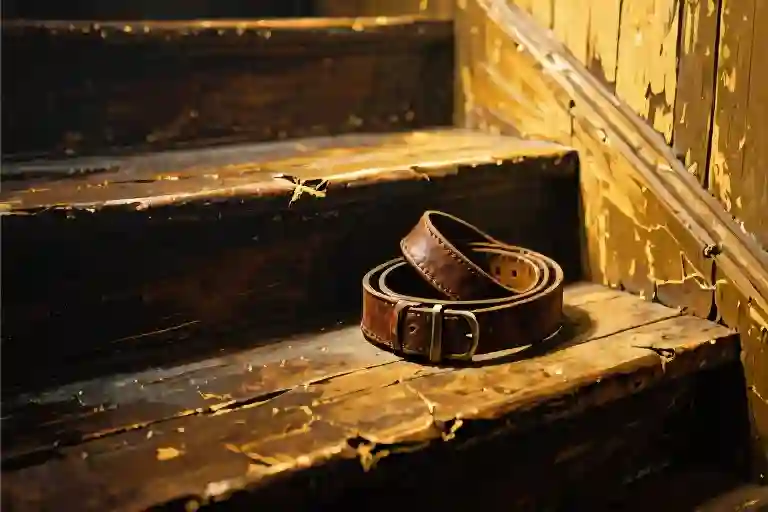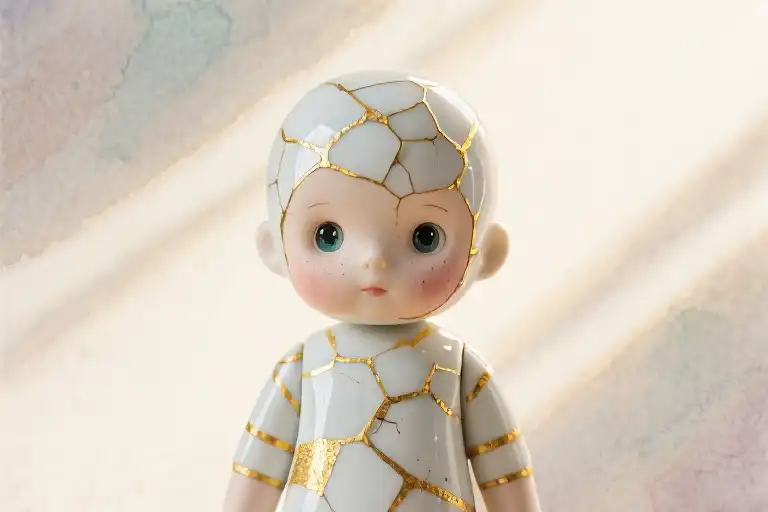No.
The word hangs in the air like the smell of burnt toast—unmistakable, irreversible. Four whams echo against the walls, each strike landing softer than the last as the reality sinks in. The belt in her hand might as well be an executioner’s tool, but today the blade gets dull.
This isn’t about disobedience. This is about power stolen back—the quiet rebellion that begins when a Black child realizes their body isn’t communal property. The leather makes its familiar arc through the air, same trajectory as last Thursday, same as the Sunday before that. Only this time, my palm intercepts its journey with the precision of a subway rat snatching a dropped pretzel.
Her wrist goes slack mid-swing. The shock tastes metallic, like biting aluminum foil. For three years this belt wrote its commandments on my skin, but today the ink runs dry. That pause—half a heartbeat where the old rules dissolve—lasts just long enough for me to feel the grooves in the leather where my spine used to curve.
The laughter comes unbidden, a bark of sound that cracks the ceiling. Not the nervous giggle of past beatings, but the full-throated kind that shakes windowpanes. Her mouth moves, recycling threats that lost their potency the moment I caught that flying strap mid-air. The script we’ve rehearsed a hundred times has missing pages now, and we’re both fumbling through improv.
When the belt clatters down the stairwell, it takes with it the unspoken contract—the one that said her anger had rights to my flesh. The sound it makes hitting concrete isn’t dramatic. Just another dead thing falling.
The Rhythm of Violence
The belt came down like it always did—with the same practiced arc, the same leather whistle through the air before impact. Three years of Thursday nights had taught me its geography: the way the buckle left crescent moons on my forearm, how the tip always found that tender spot above my left knee.
Wham.
Third strike this week. Same wrist. Same script.
I used to count the cracks against my skin like some twisted bedtime story. One Mississippi, two Mississippi—measuring the pauses between blows like storm surges. But tonight, the rhythm felt different. The belt still bit, but the fear had curdled into something hotter.
Her grip on the leather was looser now, fingers slack from repetition. I could see the frayed edge where she’d wrapped duct tape around the buckle last winter. That tape had outlasted two jobs and three boyfriends. Some things just won’t die clean.
The air smelled like sweat and Lemon Pledge. Same as when I was seven and hid behind the couch, same as when I turned twelve and stopped crying. History has a way of looping until someone changes the record. Tonight, the needle was skipping.
She raised her arm again, elbow cocked at that forty-five-degree angle that meant business. The belt hung limp for half a second—long enough for me to see the sweat stain blooming under her arm, long enough to notice how the hallway light made her gold fillings glow. Funny what you see when you stop waiting for the pain.
Three years of Thursdays. Three years of the same belt singing the same song. But music only sounds like music when someone’s listening. Tonight, I turned off my ears.
The Glow of Rebellion
The leather cut through the air with that familiar whistle—the same sound that used to make my shoulders tense before the pain even landed. But not this time. Something had shifted in my chest, like when Bruce LeRoy found his glow in The Last Dragon. Not some mystical kung-fu bullshit, but that moment when you realize the power was inside you all along.
Three years of taking it. Three years of counting ceiling cracks while that belt turned my skin into a roadmap of raised welts. I could’ve told you exactly how many lightbulbs were burnt out in the hallway fixture (two), how many seconds between the wind-up and impact (1.8, if she’d been drinking). But today the numbers didn’t matter. Today the script flipped.
When her arm came down again, my hand shot up—not to block, but to catch. The leather slapped against my palm like a dead fish, all its sting neutralized. For half a second, we both froze. Her face did that thing white folks’ internet does when too many tabs are open—complete system failure.
That’s when I felt it: not heat, not anger, but this electric current running from my fingertips to my toes. Not quite glow, maybe, but close enough. Close enough to make my laugh come out all jagged and mean when I saw her grip loosen.
“Oh you gon’ hit me?!” she kept screaming, but her voice had that tinny sound of a battery dying. The belt wasn’t hers anymore. The power wasn’t hers anymore. And that realization tasted better than all the peanut butter sandwiches she’d ever made me as apology breakfasts.
I didn’t throw it hard. Didn’t need to. Watched it slither down the stairs like the dead thing it was, knowing she’d have to walk past it later. Knowing she’d see it coiled there every time she thought about raising her hand again.
Some rebellions don’t need banners or speeches. Sometimes power shifts in the space between a raised arm and a stolen belt. Sometimes the glow comes from realizing you’ve been the dragon all along.
The Half-Second Revolution
The belt hung in the air like a paused film frame—that quarter-inch thick strip of leather suddenly weightless between her rage and my rebellion. Time didn’t actually slow down, but my brain started processing at quadruple speed. The smell of old sweat embedded in the belt’s grain. The way her pinky finger hooked slightly outward when she swung. The millimeter gap between the buckle and my forearm where I could intercept.
My palm stung before I even made contact. Not from pain—from anticipation. The leather felt warmer than I expected when my fingers closed around it, like grabbing the tail of some exhausted animal that had been chasing me for years. Her acrylic nails scraped against my knuckles in that half-second tug-of-war, leaving three parallel white lines that wouldn’t turn red until later.
There’s physics to stealing power from someone’s hands. You don’t pull straight back—that just escalates the struggle. You twist sideways at 45 degrees, exploiting the weak angle where their wrist can’t follow. I learned that from watching bus drivers yank fare evaders off the doors last summer. Now here I was applying street physics to domestic warfare.
The belt came away with a sound like Velcro separating. Not the dramatic whoosh you’d imagine, just a sticky thwip of leather peeling away from sweat-damp palms. Her hand stayed frozen in midair for two full breaths, fingers still curled around invisible punishment. That’s when I realized—the actual weapon wasn’t the belt. It was the expectation that I’d keep accepting it.
The Frequency of Freedom
The laugh tore through the room like a shockwave—the kind that cracks glass if it hits the right pitch. Mine did. I felt it in my molars, in the light fixture trembling above us, in the way her grip on my wrist went slack. That sound wasn’t just noise; it was a seismic readout of the power shift happening in real time.
Her face did something complicated then. Not anger, not quite. More like the expression of someone who’d just heard their alarm clock scream instead of beep. Confusion with a side of existential dread. The script she’d been reading from for years had spontaneously combusted mid-scene.
Still holding the belt—now just a limp strip of leather instead of a weapon—I turned toward the stairs. Not fast, not slow. Deliberate. The kind of movement that says I control time here. When I let it drop, I didn’t watch its descent. Didn’t need to. The act of throwing it away mattered more than where it landed.
Somewhere between the third and fourth step, the belt hit wood with a thud softer than expected. Like the sound a king’s crown might make rolling across cobblestones after the revolution. Down there in the dark, it was just dead weight. Up here where I stood? The air smelled like ozone after lightning. Like something old had been burned away.
That’s the thing about reclaiming power—it’s not always loud. Sometimes it’s the quiet after your own laughter echoes. Sometimes it’s the way your shoulders don’t tense waiting for the next blow. And sometimes, it’s a belt lying useless at the bottom of the stairs while you walk away dry-eyed for the first time in your life.
The Aftermath
The air in the room changed after the belt left her hand. Not the way storm clouds part after rain—more like the sudden silence when a record scratches to a stop mid-chorus. Her shadow trembled against the wall, a flickering silhouette without its weapon. Mine didn’t.
Funny how objects hold power until someone decides they don’t. That belt had been a conductor’s baton, a judge’s gavel, a whole damn legal system stitched into leather. Now it was just a thing clattering down the stairs, landing wherever dead things go. I didn’t watch its descent. Some rituals don’t deserve witnesses.
She made sounds—gasping, sputtering noises like a engine refusing to turn over. But the script had burned. No more lines about respect, no more verses from the old hymns of ‘I’m doing this because I love you.’ The stage was empty except for her shaking hands and my steady ones.
Power shifts aren’t always earthquakes. Sometimes it’s the quiet realization that you’ve been holding your breath for years, and the world didn’t end when you finally exhaled. The house still stood. The walls didn’t cave in. The only thing broken was the spell.
So here’s the question that matters: Where did you throw your belt? Not the physical one—the symbol. The rule. The ‘this is how it’s always been’ lie you finally ripped off its hinges. Was it in a conversation? A resignation letter? A glance across a dinner table that said ‘try it’?
Because rebellion isn’t always fireworks. Sometimes it’s the echo of leather hitting hardwood, fading down the stairs until you can’t hear it anymore.
The Belt Is Just Dead Skin Now
That single word still hangs in the air like smoke after gunfire. “No.” Not shouted, not whispered—just planted there between us like a flag on conquered land. The belt lies coiled at the foot of the stairs where I threw it, nothing more than a strip of lifeless leather now. Power shifts funny like that—one moment it’s a weapon in someone’s hand, the next it’s just… dead skin.
Three years of welts and apologies still itch beneath my sleeves, but the script got rewritten today. Funny how rebellion smells like old leather and ozone. That belt used to sing through the air with its own terrible music, but now? Silence. The kind that comes after the last note of a war song.
She’s still staring at her empty hands as I walk past. No triumphant speech, no victory dance—just the creak of floorboards under my sneakers. The house feels different when you’re not bracing for impact. Lighter. Like someone finally opened a window in a room that’s been sealed for decades.
Downstairs, the belt makes a sad little curve against the baseboard. Not a threat anymore, just debris. A relic from some ancient battle nobody will remember tomorrow. I almost want to laugh again—all that fear, all that power, reduced to this wrinkled thing that wouldn’t even make a good shoelace.
Maybe that’s how rebellions really end. Not with explosions or speeches, but with ordinary objects returning to what they always were: just things. The throne becomes a chair. The crown becomes metal. The belt becomes… stairs.
Your turn. Where did you throw yours?





